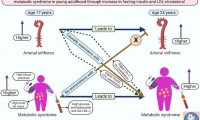-
Quest to Reach Another Segment in Liquid Biopsy with New M&A
- Source: drugdu
- 142
- May 1, 2023
-
Do ketogenic diets elevate low-density lipoprotein cholesterol levels?
- Source: drugdu
- 199
- April 29, 2023
-
Novartis trims 10% of drug pipeline in research cutback
- Source: drugdu
- 225
- April 27, 2023
-
High-protein diet counters adaptive thermogenesis in prediabetic individuals
- Source: drugdu
- 142
- April 27, 2023
-
Arterial stiffness may be a novel risk factor for childhood and adolescent metabolic disease
- Source: drugdu
- 109
- April 27, 2023
-
Study shows no significant cognitive benefit of adhering to Mediterranean diets regardless of calorie intake
- Source: drugdu
- 134
- April 27, 2023
-
New research reveals how coffee and tea can affect risk of early death for adults with diabetes
- Source: drugdu
- 131
- April 24, 2023
-
Are Electric Vehicles Safe for Pacemaker Patients?
- Source: drugdu
- 140
- April 20, 2023
-
Study Suggests Increased Number of PMA Supplements Increase Recall Risk
- Source: drugdu
- 140
- April 20, 2023
-
Higher intake of flavonols linked to lower risk of frailty onset in adults
- Source: drugdu
- 111
- April 19, 2023
your submission has already been received.
OK
Subscribe
Please enter a valid Email address!
Submit
The most relevant industry news & insight will be sent to you every two weeks.













